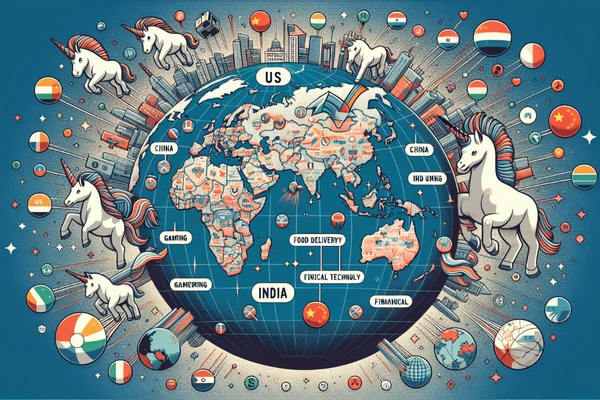Hurun Global Unicorn Index 2024 According to the Hurun Global Unicorn Index 2024, India for the first time recorded a decline in unicorn creation since 2017.
What is Unicorn Company?
- A unicorn company is a privately held startup company that has a valuation of over $1 billion and is not listed on the stock market.
- The term was first popularized by venture capitalist Aileen Lee in 2013, who chose the mythical animal to represent the statistical rarity of such successful ventures.
Key findings of the Index:
- India in 2023 had 67 unicorns, which is one less than 68 such startups in 2022, yet it retains its status as the world’s third-largest hub for unicorns.
- The US led the list with 703 unicorns, up 37 from 2022, and China ranked second with 340 unicorns.
- UK and EU ranked No 4 and No 5 in the list, respectively.
- The total value of the world’s unicorns have reached US$5 trillion, equivalent to year 2022’s GDP of Japan.
- The global count of unicorns surged by 171 over the past year, reaching a total of 1,453, marking a 7% increase and setting a new world record.
- The United States alone added 70 new unicorns, while China added 56.
- However, both countries also experienced the highest number of dropouts, with 21 and 11 companies respectively ceasing to be unicorns.
What led to decline in India?
- Indian founders are establishing more unicorns abroad than at home.
- The country produced more offshore unicorns than any other country, co-founding 109 unicorns outside of India compared to 67 in India.
- Slowdown of India’s startup ecosystem, which is mainly attributed to a lack of investment in startups.
- Failure to take prudent measures to ensure business sustainability has resulted in uncontrolled growth, marked by rapid depletion of cash reserves.
Initiatives taken by India to promote start-ups:
- Atal Innovation Mission (AIM): The scheme, launched by the government in 2016, aims to foster innovation by introducing new programs and policies to support startup development across various economic sectors.
- Multiplier Grant Scheme (MGS): The Department of Electronics and Information Technology initiated the Multiplier Grant Scheme (MGS) to empower collaborative research and development among industries for the growth of goods and services.
- Startup India: A program that provides venture capital funds to startups, credit guarantees for loans, and an AI-based matchmaking platform to connect startups with investors.
- SIDBI Fund of Funds: A fund that provides capital to startups and encourages private investments.
- Tax incentives: Tax exemption on capital gains invested in the Fund of Funds, and a 100% deduction of profits and gains from eligible businesses for three consecutive assessment years.
- Startup India Seed Fund Scheme: The Government of India introduced this scheme in January 2021 to support early-stage startups.
- National Start-up Award: It aims to recognize, promote, and provide exclusive handholding support to a diverse range of startups.
India’s startup ecosystem
- As of 2023, India has the third largest startup ecosystem in the world, with over 1,12,718 startups recognized by DPIIT across 763 districts.
- The startup ecosystem has experienced exponential growth over the past decade, with a 15% year-on-year growth rate in 2018.
- In 2020, over 16,000 new tech companies were added, and in 2023, investment firms provided a total of $8.4 billion in funding.
- The startup ecosystem has witnessed a 15-fold increase in total funding, a nine-fold increase in the number of investors, and a seven-fold increase in the number of incubators.
Ref:Source
| UPSC IAS Preparation Resources | |
| Current Affairs Analysis | Topperspedia |
| GS Shots | Simply Explained |
| Daily Flash Cards | Daily Quiz |



